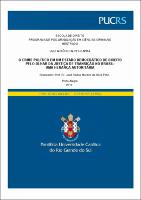| Share record |


|
Please use this identifier to cite or link to this item:
https://tede2.pucrs.br/tede2/handle/tede/8880| Document type: | Dissertação |
| Title: | O crime político em um estado democrático de direito pelo olhar da justiça de transição no Brasil : uma herança autoritária |
| Author: | Capra, Luiz Antonio Alves  |
| Advisor: | Silva Filho, José Carlos Moreira da |
| Abstract (native): | A proposta deste trabalho é de, a partir de um olhar justransicional, apurar se o conceito jurisprudencial adotado pelo Supremo Tribunal Federal na atualidade, em relação ao crime político, em um Estado Democrático de Direito, ainda contém alguma permanência autoritária. A pesquisa bibliográfica e documental (jurisprudência) realizada é de natureza qualitativa, do tipo exploratória. Discorre-se, inicialmente, acerca da origem, da evolução e do conceito para, a partir daí, estabelecer em que consiste o ponto de vista da Justiça de Transição. Em seguida, examina-se o período concernente à ditadura militar no Brasil (1964-1985), a partir da análise da disputa de narrativas que ainda hoje se estabelece a partir da Teoria dos Dois Demônios. Depois se traça a linha que permite interligar, a partir da Guerra Fria, a guerra ao comunismo, a Doutrina de Segurança Nacional, o golpe de Estado, as diversas Leis de Segurança Nacional adotadas ao longo do período e o crime político. Em etapa posterior, analisa-se os conceitos de crime político, terrorismo, terrorismo de Estado e direito de resistência e discute-se se este serve para descaracterizar o crime político. Construído o arcabouço doutrinário, investiga-se a jurisprudência do Supremo Tribunal Federal acerca do crime político e de questões correlatas, a partir de quatro períodos históricos (1930-1946, 1946-1964, 1964-1988 e 1988-2018). A partir deste exame jurisprudencial, a pesquisa aponta para a existência de uma permanência autoritária oriunda do período 1964-1985, ainda não superada pelo STF (e pelo legislador), a indicar que não foi alcançada, nesse campo, a plenitude do Estado Democrático de Direito. Identifica-se que o Poder Judiciário se constitui em importante instrumento da Justiça de Transição, ao mesmo tempo em que, enquanto instituição, apresenta um déficit transicional. Além disso, aponta-se que, diante da existência de permanências autoritárias, ainda não se completou a travessia do regime antecessor autoritário para o regime democrático pós-ditadura |
| Abstract (english): | The proposal of this work is, as of a transitional justice look, to ascertain if the jurisprudential concept currently adopted by the Supreme Court in relation to the political crime in a Democratic Rule of Law, still maintains some authoritarian permanence. The bibliographical and documentary research (jurisprudence) carried out is of a qualitative nature, of the exploratory type. Initially, we discuss the origin, the evolution and the concept in order to establish the point of view of the Transitional Justice. In a second moment the research turns to the examination of the period concerning the military dictatorship in Brazil (1964-1985), begins with the analysis of the dispute of narratives that still exists today with support in The Theory of Two Demons. Then the line is drawn that allows to interconnect, from the Cold War, the war on communism, the National Security Doctrine, the coup d'état, the various National Security Laws adopted throughout the period and political crime. In a later stage, the concepts of political crime, terrorism, state terrorism and right of resistance are analyzed, and it is discussed if this serves to decharacterize political crime. Once the doctrinal framework has been constructed, the jurisprudence of the Federal Supreme Court on political crime and related issues is investigated, starting from four historical periods (1930-1946, 1946-1964, 1964-1988 and 1988-2018). From this jurisprudential examination, the research points to the existence of an authoritarian permanence from the period 1964-1985, still not surpassed by the STF (and by the legislature), indicating that the fullness of the Democratic Rule of Law has not been achieved in this field. It is identified that the Judiciary is an important instrument of the Transitional Justice, while at the same time, as an institution, it presents a transitional deficit. In addition, it is pointed out that, given the existence of authoritarian stays, the passage from the authoritarian predecessor regime to the post-dictatorship democratic regime has not yet been completed. |
| Keywords: | Justiça de Transição Estado Democrático de Direito Doutrina de Segurança Nacional Supremo Tribunal Federal Crime político |
| CNPQ Knowledge Areas: | CIENCIAS SOCIAIS APLICADAS::DIREITO |
| Language: | por |
| Country: | Brasil |
| Publisher: | Pontifícia Universidade Católica do Rio Grande do Sul |
| Institution Acronym: | PUCRS |
| Department: | Escola de Direito |
| Program: | Programa de Pós-Graduação em Ciências Criminais |
| Access type: | Acesso Aberto |
| Fulltext access restriction: | Trabalho será publicado como artigo ou livro |
| Time to release fulltext: | 60 meses |
| Date to release fulltext: | 16/09/2024 |
| URI: | http://tede2.pucrs.br/tede2/handle/tede/8880 |
| Issue Date: | 29-Mar-2019 |
| Appears in Collections: | Programa de Pós-Graduação em Ciências Criminais |
Files in This Item:
| File | Description | Size | Format | |
|---|---|---|---|---|
| DIS_LUIZ ANTONIO_ALVES_CAPRA_COMPLETO.pdf | LUIZ_ANTONIO_ALVES_CAPRA_DIS | 1.25 MB | Adobe PDF |  Download/Open Preview |
Items in DSpace are protected by copyright, with all rights reserved, unless otherwise indicated.




